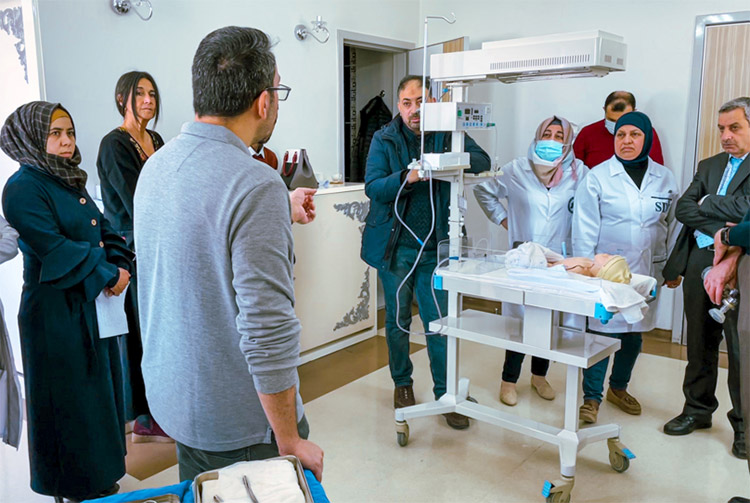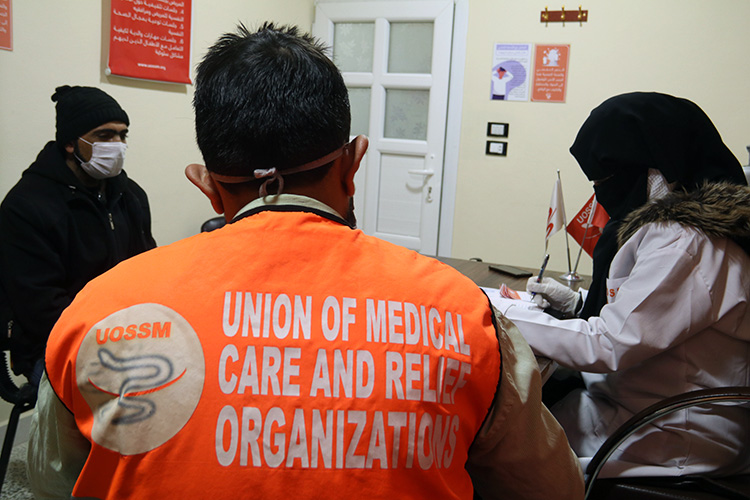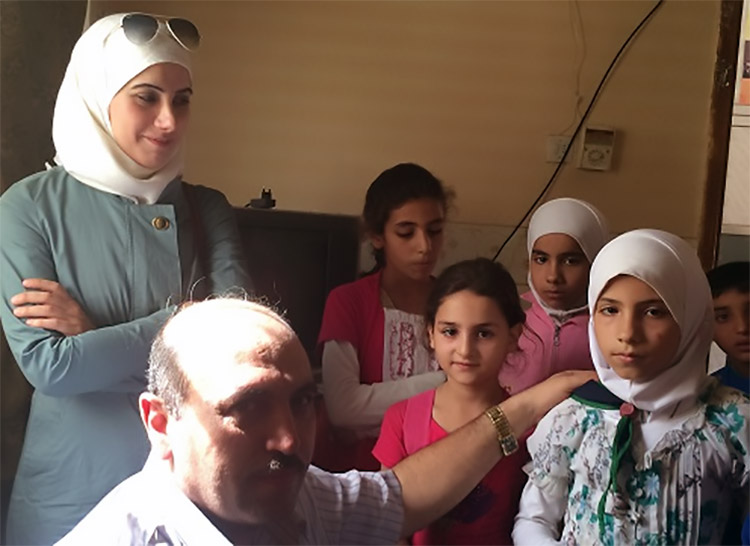EENC training programme held in Gaziantep, Turkey

27 March 2022 - The preparation for the second phase of the Early Essential Newborn Care (EENC) training programme started early January 2022 by having a coordination meeting with Sexual Reproductive Health Technical Work Group to select the targeted maternal hospital and the list of participants. This was followed by visiting the hospital proposed to host the training here in Gaziantep to check the place and available labor rooms and other required medical equipment and supplies.
The process of obtaining the cross-border permission for the selected participants from north west Syria started in late January 2022 and the start date of the EENC training programme was 13th March 2022 and continued for two sequenced weeks to 27th March 2022. The Agenda and training materials were developed and shared with the participants who came from 13 Hospitals inside north west Syria. All logistic issues will be managed by WHO’s Partner, IDA, to ensure everything is well organized.
EENC is an evidence-based approach to improving newborn care in the final stage of labour and the first hours of life. It was developed in the Western Pacific Region of WHO and has now been adopted and scaled-up in over 15 countries, including China, Viet Nam, Cambodia and Philippines. EENC focused on preventing mortality from asphyxia, infection and prematurity, the most common causes of newborn death. It does this by delivering simple evidence-based interventions, including immediate and sustained skin-to-skin contact between mother and baby, delayed cord clamping and early initiation of breastfeeding, at the time of birth. EENC uses adult-based learning principles to coach gynecologists, pediatricians and midwives in their usual practice environments across WRPO countries.
Since 2017, EENC coaching programmes have been introduced across the Eastern Mediterranean region, in Pakistan, Sudan, and Palestine and will soon to be taken to Yemen. Coaching of hospital staff in NW Syria began in late 2021, with a second round of coaching completed in March 2022. WHO would like to thank all those involved in EENC in Turkey, Syria and across the globe, for their commitment to ensuring that no newborn is left behind.
For more information, please contact
Grattan Lynch, Communications Officer
E-mail:
Following the success of mental health tele-sessions by WHO and UOSSM partnership, tele-medicine reaches northwest Syria

Northwest Syria, 24 February 2022 — A fruitful partnership between WHO and the Union of Medical Care and Relief Organizations (UOSSM) is further extending its health care support to the people of northwest Syria by initiating a telemedicine consultation service — the first of its kind in the Region — in collaboration with the Syrian Expatriates Medical Association (SEMA).
Due to the increasing numbers of people suffering from mental health problems in the conflict zone of northwest Syria, WHO and partner UOSSM began providing mental health tele-support in 2021. To date, over 1025 mental health tele-sessions have been offered to more than 310 patients by 4 mental health tele-workers and a psychiatrist. The services – available from 9am to 9pm, six days a week – address a growing demand, which has been greatly exacerbated by the COVID-19 pandemic.
In true community spirit and following the success of the mental health tele-sessions, 19 volunteer doctors began work through SEMA on the HRIS Telemedicine Platform, with the first pediatric tele-consultations taking place on 20 October 2021 in northwest Syria's Al-Ekhaa Hospital.
Supported by WHO and the Humanitarian Grand Challenges Organization, this initiative will dramatically reduce caseloads and increase shared expertise among programme users in an effort to help save lives, particularly during the COVID-19 pandemic. The programme will be implemented in 3 different types of medical centres in northwest Syria: mental health, pediatrics, and critical care.
WHO and partner UOSSM continue to deliver health care support to the people of the conflict zone of Northwest Syria, where it is direly needed.
For more information, please contact:
Grattan Lynch
Communications Officer
E-mail:
Severe snowstorm in northwest Syria creates challenges for health response

26 January 2022, northwest Syria – As a snowstorm devastated the conflict zone of northwest Syria, WHO and the Health Cluster mobilized efforts to deploy rescue health services to the affected region, home to some 4.4 million people with little to no infrastructure.
On top of COVID-19, a severe snowstorm swept through northwest Syria on the night of 18 January, with temperatures plummeting as low as -15 ºC. A lack of fuel and heat, logistical difficulties, and delivery shortages – just some of the area’s daily challenges – were further exacerbated by the dangerously cold weather and the heavy snowfall. More than 59 camps for internally displaced people (IDPs) were damaged, affecting the lives of over 88 000 Syrians.
WHO was particularly concerned with the provision of immediate health services to the affected areas in the Afrin district. “We are receiving reports of extra needs for medicine and more referral services,” said Mahmoud Daher, Head of the WHO Gaziantep Field Presence, adding that reports of the closure of health facilities due to the extreme weather conditions had also been received.
WHO and the Health Cluster took instant action, coordinating with all partners in the Afrin district to come to the aid of the most affected populations. By 21 January, associates in the Health Cluster had already deployed their mobile teams and ambulances to the IDP camps and communities in Sharan, Sheikh Al Hadid, Ma’abatli, and Raju sub-districts.
WHO has recently launched an appeal for the support of the population of Syria. The current crisis confirms the urgent need for such support.
The freezing weather is especially dangerous to pregnant women, chronically-ill patients, and children – who are the most vulnerable. Following the harsh snowfall, doctors are reporting higher numbers of children with respiratory diseases.
WHO and the Health Cluster will continue to deliver extra support and services to the people of northwest Syria throughout this life-threatening season.

For more information, please contact:
Grattan Lynch
WHO Communications Officer
E-mail:
Curing Leishmaniasis in northwest Syria

15 November 2021- As WHO is dedicated to alleviating the suffering of the greatest number of people, particularly those most in need, it works with the MENTOR Initiative in northwest Syria – where IDP Camps house dense concentrations of displaced Syrians living in squalid conditions – to combat Leishmaniasis, a parasitical disease spread by the bite of infected sandflies.
Those marginalized by conflict and poverty -- and particularly the children among them - are the most vulnerable to the disease due to the overcrowding and poor sanitation characteristic of their living conditions. Come autumn, female sandflies pick up the Leishmaniasis parasite and transmit it to humans, their bite causing great damage, especially to the soft skin tissue of children.
In August 2021, a 60-year-old father brought his eight-year-old daughter to the MENTOR-supported PHC facility in Hazano, in Idlib Governorate’s Maaret Tamsrin sub-district. The girl’s face showed severe lesions with inflammation of the skin. For two months, she had been receiving herbal treatments only, and her father grew concerned with her condition which worsened by the day. If the lesions continued to grow, they would cause permanent deformity to his daughter’s face.
The lesions were diagnosed at the Hazano PHC as caused by cutaneous Leishmaniasis. Due to the severity and location of the lesions, an instant treatment of daily intramuscular Glucantime injections was commenced and prescribed to continue for 28 days. Her blood was monitored to ensure she suffered no side effects as a result of the treatment. The photographs below -- taken at initial presentation, then at 1 week, 3 weeks and 45 days from diagnosis – reveal the progression of the girl’s improvement, which occurred quickly once her treatment began.
The father brought his daughter back to the MENTOR-supported PHC facility in Hazano two weeks after the conclusion of her treatment for a follow-up appointment to confirm that the lesions were completely cured. As the photos show, this free and absolutely vital service supplied by the MENTOR Initiative saved this young child. Not only did Leishmaniasis cause lesions which would have psychologically scarred the child for life, but it is also a potentially fatal disease if left untreated. Persons suffering severe cases have perished under Leishmaniasis, either due to the disease itself or to the complications brought about by expanding cutaneous lesions.
WHO extends its sincere gratitude to its partner, the MENTOR Initiative, for the splendid work it carries out day to day in northwest Syria.
For more information, please contact:
Grattan Lynch
Communications Officer
E-mail:


